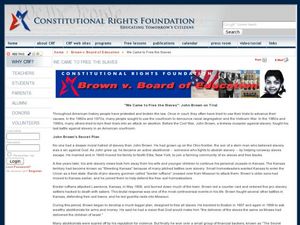National Endowment for the Humanities
A Debate Against Slavery
Slavery is a serious topic that can be challenging for middle schoolers to study. Young scholars can see firsthand through primary sources what occurred during that time period in the United States. The third of five lessons provides...
Curated OER
Abolishing Slavery In America
Students discover details about abolition. In this slavery lesson plan, students watch Abolishing Slavery in America and then conduct further research about the events that took place on the Zong and Amistad. Students write essays that...
Curated OER
Abolitionists and Proponents of Slavery
Eleventh graders compare and contrast the visions of abolitionists and proponents of slavery. In this slavery lesson, 11th graders read primary documents representing both sides of the slavery issue and use graphic organizers to analyze...
Curated OER
Slavery and Abolition: Three Unforgettable Names
Students research the people and events involved in the abolitionist movement prior to the U.S. Civil War. They read about and discuss the roles of Nat Turner, Harriet Tubman, and John Brown. Students complete a word splash, Venn...
Curated OER
Abolitionists in U.S. History
Students read and discuss excerpts from the writings of Henry David Thoreau, Frederick Douglass and Sarah Parker Redmond. They compare and contrast the views of the three abolitionists concentrating on the experiences and reasons for...
Curated OER
The Last Day of Slavery
Students complete pre reading, writing, during reading, and interdisciplinary activities for the book The Last Day of Slavery. In this reading lesson plan, students complete journal entries, go over vocabulary, answer short answer...
Curated OER
The Abolitionist Movement: A Fight for Freedom
Sixth graders investigate the Civil War by identifying famous figures of the era. In this slavery abolitionist lesson, 6th graders read a text on the history of the Civil War and discuss heroes of the era such as Harriet Tubman and John...
Curated OER
"We Came to Free the Slaves": John Brown on Trial
Students explore the plight of John Brown to fight slavery. In this Brown vs. Board of Education lesson, students listen to a lecture regarding Brown's work to free slaves through rebellion. Students participate in classroom discussion...
Curated OER
Landmarks of the Underground Railroad
Ninth graders explore the impact of the Underground Railroad. In this slavery lesson plan, 9th graders read about the Shadrach Minkins case and discuss the details of the Fugitive Slave Act of 1850. Students consider how the Underground...
Curated OER
Creating an Abolitionist Newspaper
Fourth graders develop an understanding of the lives of slaves and their quest for freedom. They develop an understanding of the people who fought against slavery and the efforts that were made by them to create a better life for all...
Middle Tennessee State University
John Brown: Hero or Villain?
"Love it or leave it." "You're either for us or against us." Rhetoric and it's polarizing effects are the focus of a instructional activity that uses John Brown's attack on Harper's Ferry as an exemplar. Groups examine primary source...
Curated OER
Knowledge is Power
High schoolers explore the distinct forms of knowledge that enslaved Africans brought with them to America or developed while enslaved. They study how political movements of the 18th century helped develop abolitionist thinking.
EngageNY
Grade 9 ELA Module 4, Unit 1, Lesson 11
As part of a study of how writers structure their text so that readers understand events, class members do a close reading of "Is It Lawful to Make Slaves of Others Against Their Will?" a chapter in Aronson and Budhos' Sugar Changed the...
Center for History Education
Speaking Up and Speaking Out: Exploring the Lives of Black Women During the 19th Century
Young historians investigate the often-hidden history of free and enslaved African American women before the Civil War. Using a collection of primary and secondary sources, including speeches, diaries, and poems, they evaluate the often...
Curated OER
Uncle Tom's Cabin as Anti-Slavery Argument
Pupils read and discuss how African- Americans are depicted in slave auction announcements. They research how Harriet Beecher Stow responds to the sale of slaves.
Curated OER
Fredrick Douglass...A Digital History
Seventh graders research the life of Fredrick Douglass. In this Fredrick Douglass instructional activity, 7th graders read about his life and discuss it. They write poetry describing his experience as a slave and create their own...
Curated OER
John Brown's Raid on Harper's Ferry and John Brown's Body
Fourth graders discuss John's Brown's Raid on Harper's Ferry. In this John Brown instructional activity, 4th graders analyze a newspaper article about the raid, and write a descriptive obituary about John Brown. Students view pictures of...
Curated OER
Underground Railroad
Pupils research and discuss the use of the Underground Railroad by fugitive slaves. They debate the actions of abolitionists and slave owners according to the laws of the time, create drawings and write narratives.
Curated OER
James McCune Smith: A Model of Resistance
Students discuss examples of resistance. In this anti-slavery lesson, students analyze a portrait of James McCune Smith and listen to a lecture about his life and involvement in abolition. Students analyze his actions and write a letter...
Curated OER
Missouri's Early Slave Laws: Missouri's Early Slave Laws:
Students analyze and discuss various documents relating to slavery in Missouri in the 1830's and 1840's. They learn why some records are deemed to be of permanent, historical value to the state.
Curated OER
John and Mary Jones and the Importance of Oral History
Students examine the role of John and Mary Jones in the abolitionist movement. Using primary source documents, they discover the importance of an oral history and take notes on the Jones' role. They write a summary of the data to...
Curated OER
150 Years of Abolition in Pennsylvania
High schoolers study the struggle for abolition in Pennsylvania starting with the Quakers first protest through the burning of Pennsylvania Hall. They conduct research using primary source documents.
Curated OER
Inspiring Freedom: The Remond Family and Abolitionism in Salem
Students examine the abolitionist movement in Salem. Exploring the contributions of the Remond family, they identify how they made the issue one of national and international importance. They discuss the views of the south and how...
National Gallery of Art
The First African American Regiment
Young historians examine a memorial sculpture of the first African American regiment in the Civil War, and then compare how the experiences of the regiment are portrayed in letters and poetry, as well as in the motion picture, Glory.

























